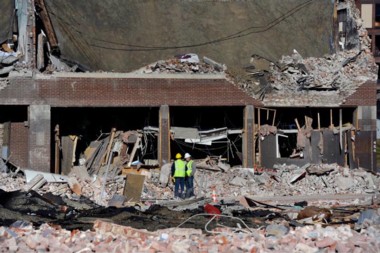A mass of broken glass and rubble covered whole blocks between Worthington and Chestnut streets in Springfield on Black Friday in 2012—the worst disaster since a tornado had leveled parts of the city in the spring of 2011. The Scores strip club was totally destroyed; 21 people were injured and dozens more were driven from their homes. The cause: a gas line that exploded when a worker, probing for a leak that was giving off an odor, accidental ruptured a pipe.
Less serious gas-related incidents occur periodically. Early in 2013, gas leaks caused evacuations in parts of neighborhoods in Greenfield and West Springfield. In April of this year, two schools in the building at 1170 Carew Street in Springfield, Van Sickle Middle School and the Renaissance School, were evacuated two days in a row because of a natural gas odor.
At the time the Worthington Street explosion occurred, a bill to streamline pipeline repairs had been in the Statehouse for three years. It would have required gas companies to inventory the leaks in their lines; map them and submit the information to local police and fire departments on request; prioritize the leaks according to the degree of hazardousness; and put them in a time frame for repair. Class 1 leaks, the most hazardous, would be repaired immediately; class 2 leaks, the next most hazardous, would have to be repaired within 12 months. Filed by Rep. Lori Ehrlich of Marblehead and written with input from Mark McDonald, president of the New England Gas Workers Association, the bill was co-sponsored by several legislators from Western Massachusetts, including Sen Stan Rosenberg of Amherst and representatives Ellen Story of Amherst, Peter Kocot of Northampton and Denise Andrews of Orange.
The initial version of the bill, Ehrlich told the Advocate, “was basically killed in committee by the gas companies, which didn’t want a bill telling them how to do their business.”
But time and catastrophes like the explosion in Springfield showed the industry and the Legislature that the bill was needed, and a provision that ratepayers could foot the bill for the work of inventorying and fixing the leaks sweetened the pot.
At last the bill has passed, and the state will no longer have to depend on random sniffing by residents to locate leaks and get them fixed.
Vinny Falkowski, a landlord on Main Street in Warren, remembers when his tenants and neighbors were frightened and a nearby XtraMart store shut down by a leak that filled their street with the smell of gas on New Year’s Day, 2013.
“I know that was only one leak of many, many of varying degrees of severity,” Falkowski recalls, adding that it’s about time the state passed a law to get the leaks fixed. “Not only am I glad that there’s a law,” he said, “I’m flabbergasted that there wasn’t a law before. What were they doing before, waiting for another disaster like Springfield?”
As passed, the bill leaves out a few provisions the original version had contained. One, for example, would have required that class 3 leaks, the least hazardous, be repaired when road constructions were under way (the bill as passed requires only that class 3 leaks be “reevaluated”). Another would have required that leaks near many kinds of “buildings of assembly” be given priority on the repair lists; the final version only stipulated that leaks near schools be given priority.
And the cost of doing the mandated work will add an estimated $1 to $2 a month to ratepayers’ gas bills. But, Ehrlich said, it will save them some $40 billion a year in gas lost through the state’s 20,000 known gas line leaks.
For leak classification and repair to be codified for the first time in Massachusetts, and for the information to be disclosed to municipalities, is a giant step for public safety in a state that replaces its aging gaslines less frequently than other states. According to a study sponsored by U.S. Rep. Ed Markey (D-Mass.), gas companies in Massachusetts replace less than 4 percent per year of their deteriorating piping, while the national average is less than 5 percent.
The new law, said Ehrlich, will “prevent not only catastrophic explosions from occurring but the daily release of methane gas from our archaic and corroded pipeline system.” In fact, Ehrlich said, her attention was first called to the issue years go by people who complained because methane, a potent greenhouse gas, was leaking from pipelines in eastern Massachusetts cities and killing trees along the streets.
Amherst fire chief Tim Nelson was exuberant about the passage of the law. “I think it’s great,” he said. “What it’s going to do is track down some of the old transmission pipes and either fix them or take them out of service. Some of this infrastructure has been there since the early 1900s. We get a number of calls in the course of a month where folks say they smell gas, and we can’t find the leaks. This law will mean that those leaks are going to be identified in a more rigorous fashion.”
Asked if Amherst will request information about where leaks might be located in the town, Nelson said, “Absolutely. Berkshire Gas has been pretty forthcoming with information on their gas lines, and this will be one more piece that will help. It will put people in a better state of mind about their safety. It’s a win-win all the way.”
Ehrlich acknowledged that she was gratified that the bill had passed after years of work and opposition. “In public service, a good day is when you can help people,” she told the Advocate the day after Gov. Deval Patrick signed the new law. “A great day is when you feel you’ve saved people’s lives. Yesterday was a great day.”•



